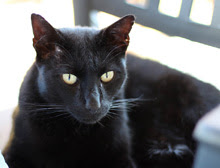Here's a typical breakfast served in French cafés and hotels. A croissant, a pain aux raisins or other pastry, a piece of baguette, butter, jam or jelly, honey, fruit juice or water, and coffee or tea. We Americans call this a "continental breakfast." I expect we got that name from the English, who traditionally eat much more hearty breakfasts.
It was years before I realized the literal meanings of petit déjeuner (breakfast) and déjeuner (lunch). The verb jeûner means "to fast." The "fast" is the time between the last meal of the day and the first meal of the next day. When we have blood work done at the lab, they ask us to come in à jeun, meaning that we've fasted since the evening before the test. So, déjeuner means to de-fast or break your fast, hence "breakfast."
I've heard that, in the days before agriculture was modernized, farmers and other laborers would be up before dawn doing what they did. They'd come in at mid-morning for the first meal of the day: le déjeuner. It was probably more of a hearty meal, savory, and with wine or beer. As people left the farms and fields for work in the cities, a lighter meal was taken at the beginning of the day: le petit déjeuner (the little lunch). The more substantial déjeuner became the mid-day lunch. I don't know how much of that is true, but it sounds plausible.
And now I read (on Wikipedia) that in time of King François I (16th century), the members of his court attended mass at eight o'clock in the morning, and would take their first meal, le déjeuner, around ten a.m. With the rise of the aristocracy and bourgeoisie, by the 19th century it became fashionable to eat a light meal as soon as one rose in the morning. This petit déjeuner pushed le déjeuner to mid-day, followed later of course by le dîner (dinner) and even later by le souper (supper).
Now I'm hungry.







That basketful of goodies looks delicious. Whatever you call it.
ReplyDeleteet dans l'Aveyron on appelait il y a plus d'un demi siècle le repas de midi le diner et celui du soir le souper... si bien que mes parents, jeunes mariés invités à Paris chez une cousine, pour diner, y sont allés à midi... imaginez leur tête et celle de la cousine ! Je ne pense pas que cette différence d'appellation existe encore...
ReplyDeleteDans ma famille, à Paris, le dîner était à sept heures, mais s’il y avait des invités, c’était alors à huit heures. Le souper, c’était à la sortie des théâtres. Le déjeuner était toujours à midi, invités ou pas.
DeleteMy maternal grandparents who very profitably worked the land used to have their 'dinner' at lunch time. I guess their evening meal was light, but they dropped that once retired.
ReplyDeleteAustralia is very divided over our evening meal. Some call it tea and others, like me call it dinner.
I was interesting to visit one of R's relatives on a farm in northern England. While very modern people, a large meal was whipped up and served at 5pm. Ouch, I thought. I can eat now but I will be very hungry later. No problem. A decent supper was served about 9.30.
I’m hungry, too.
ReplyDeleteThe typical French family breakfast is just bread, butter and jam with a bowl of coffee or tea. On Sunday, you may have a croissant in addition to that.
Now, because of the number of foreign tourists in France, hotels and cafés offer what would be close to the English breakfast, departing from the typical French one.
Ahhhhh, I did not know about any of this background, or the phrase à jeun. Very interesting!
ReplyDeleteYes, another interesting reason for the term déjeuner! Merci.
ReplyDeleteI am hungry too! That photo made my mouth water.
ReplyDeletemitch, I call it "heartburn waiting to happen." Especially with a café au lait.
ReplyDeletechristiane, LOL!
andrew, once we retired we started eating our main meal at lunch. Sleeping on a full stomach is not comfortable.
chm, I saw some people having bacon and eggs in a café on the Blvd. St.-Germain the last time I was in Paris. I had a café + croissant.
judy, the things you learn when real life kicks in.
mary, :)
michael, my work here is done. For today. ;)